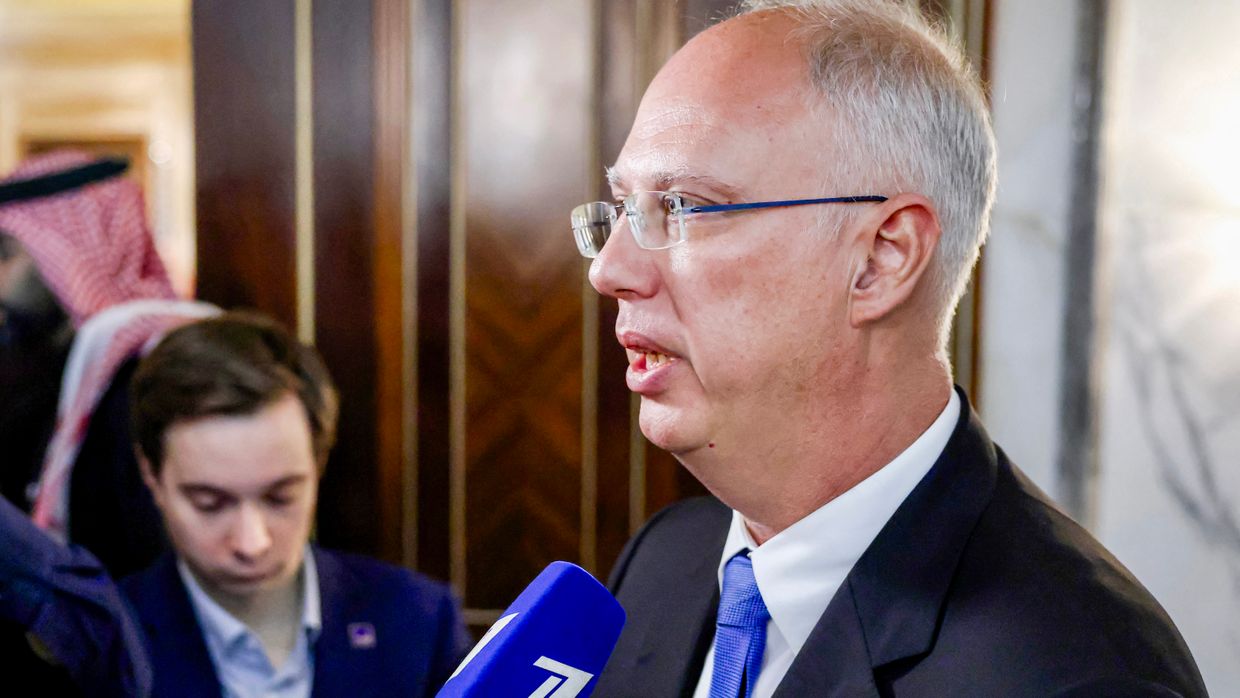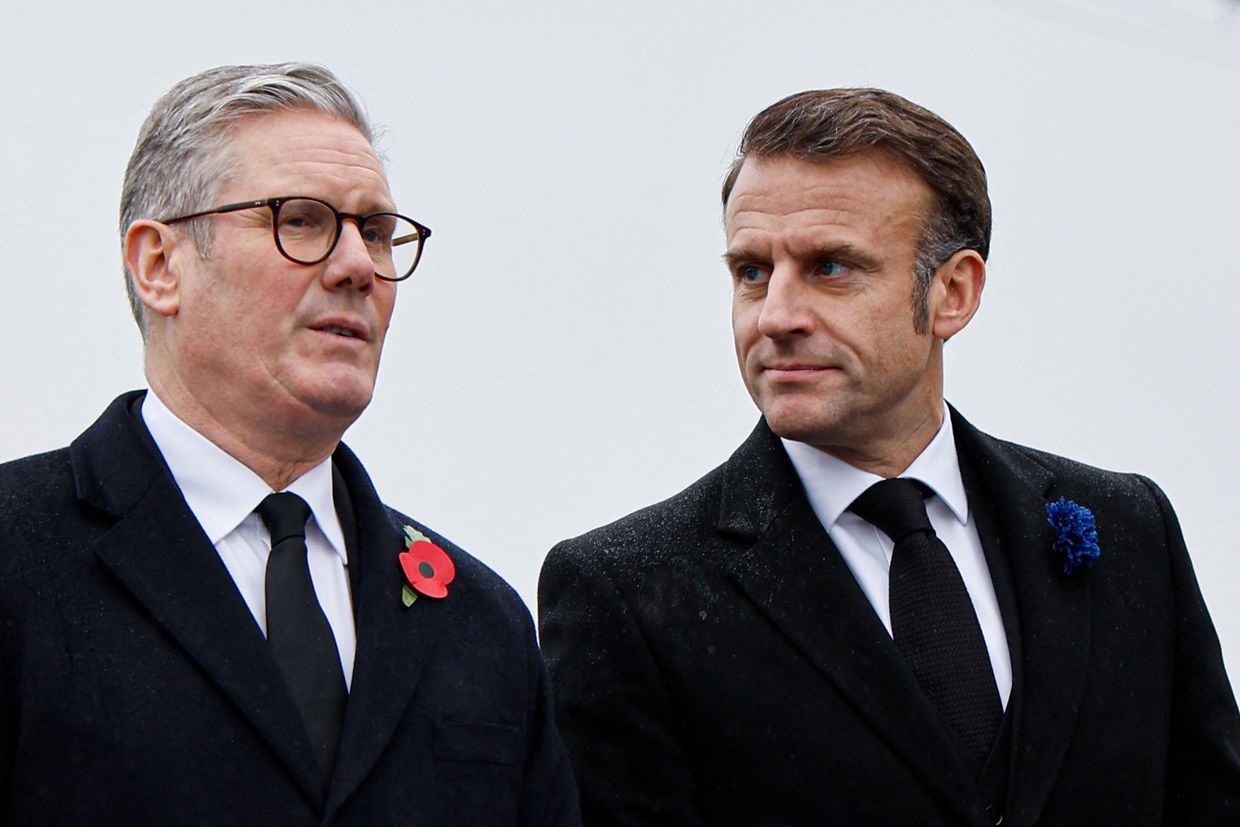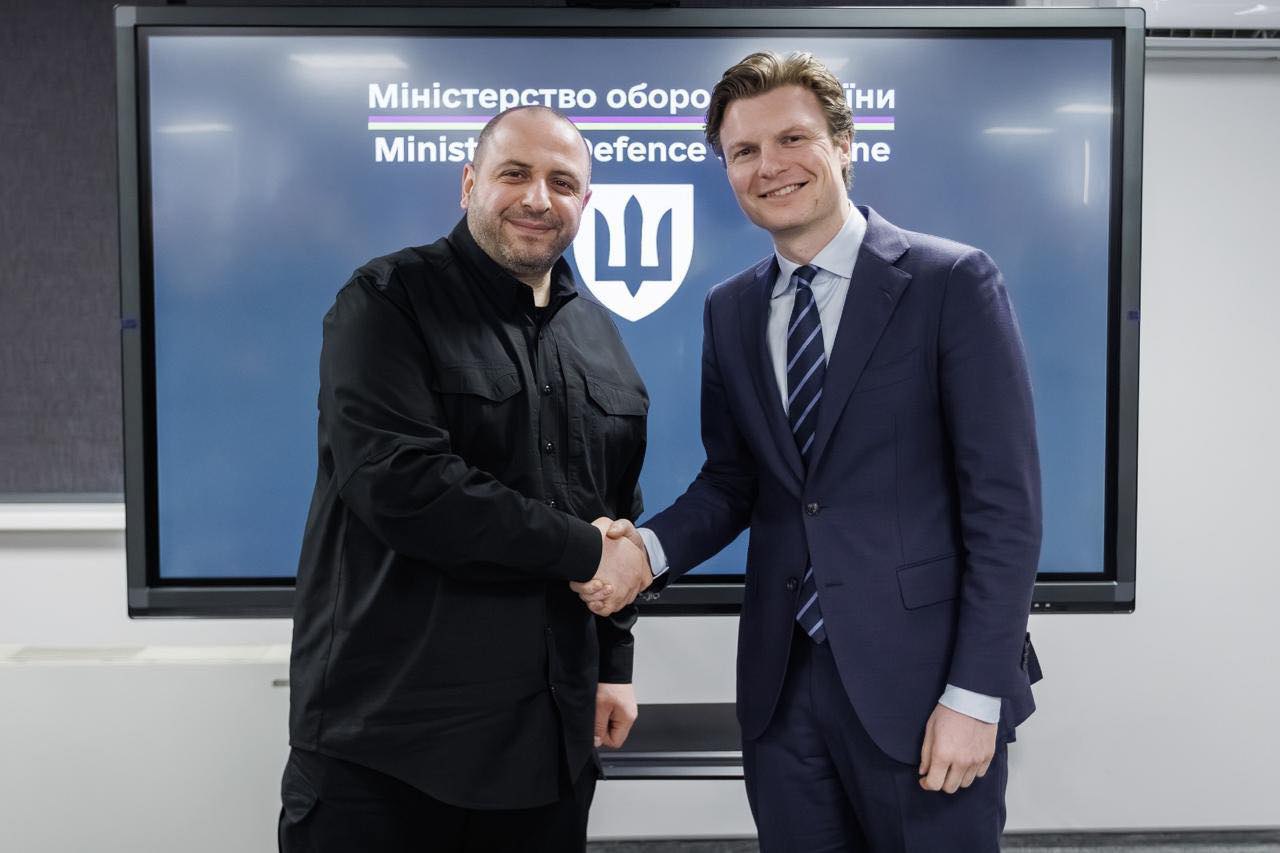Ukraine war latest: There's 'psychological deadline' for Putin to agree to Ukraine ceasefire, Trump says

Key developments on March 31:
- There's 'psychological deadline' for Putin to agree to Ukraine ceasefire, Trump says
- Kremlin says it remains open to US talks despite Trump's reported anger at Putin
- Ukraine-US talks on minerals deal ongoing, not tied to NATO membership, source says
- Russia trying to bypass Ukraine's positions in Toretsk by going underground, military says
- Sweden unveils its largest military aid package for Ukraine worth nearly $1.6 billion
- Trump's spiritual adviser visits Bucha, meets Ukraine's religious leaders
U.S. President Donald Trump said on March 30 that there is a "psychological deadline" for Russian President Vladimir Putin to agree to a ceasefire in Ukraine, without naming a specific date.
"If I think they're (Russia) tapping us along, I will not be happy about it," Trump told reporters aboard Air Force One, voicing his belief that the Kremlin's chief "wants to make a deal."
Trump has softened his rhetoric on Putin after telling NBC News earlier on March 30 he was "pissed off" with the Russian leader over his fixation on President Volodymyr Zelensky, threatening 25%-50% tariffs on Russian oil.
When asked whether his relationship with Putin is at its "lowest point," Trump said, "No, I don't think so. I don't think he's going to go back on his word... We've always gotten along well."
The U.S. president has threatened additional tariffs and sanctions against Russia several times in the past months but has yet to take the step. In turn, Trump has exerted significant pressure on Ukraine to bring it to the negotiating table, including by temporarily cutting off military and intelligence support.
Putin has rejected a full 30-day truce agreed upon by the U.S. and Ukraine in Jeddah on March 11 unless it includes conditions undermining Ukrainian defense capabilities and only agreed to a partial ceasefire on strikes against energy facilities and in the Black Sea.
Kyiv has already accused Russia of violating the energy ceasefire, while the future of the Black Sea ceasefire is in doubt as Moscow has linked it to the lifting of Western sanctions on food producers and some banks.
Finnish President Alexander Stubb, who visited Trump over the weekend at his Mar-a-Lago residence in Florida, said that the U.S. president is frustrated with Russia's delays. Stubb also proposed April 20 as a "good time" for an unconditional ceasefire.
Trump acknowledged on March 25 that Russia may be "dragging their feet" in peace talks, while Kyiv and other observers warn that Moscow intentionally prolongs the process to allow Russian forces to capture more territory.
Talking to reporters, Trump also criticized Zelensky for allegedly wanting to back out of the U.S.-Ukraine deal on natural resources.
"He's trying to back out of the rare earth deal and if he does that, he's got some problems, big, big problems," Trump said.
"He wants to be a member of NATO, but he's never going to be a member of NATO. He understands that."
Zelensky said on March 28 that he would not sign a minerals deal that interferes with Ukraine's plans to join the European Union. Bloomberg reported on March 29 that Kyiv was requesting changes to the current proposal, including greater investment from the U.S. and more clarity on how the joint fund would operate.
Kremlin says it remains open to US talks despite Trump's reported anger at Putin
The Kremlin remains willing to engage with the U.S. despite reports that President Donald Trump is "very angry" over Russian President Vladimir Putin's latest remarks on Ukraine, Kremlin spokesperson Dmitry Peskov said on March 31.
The statement follows reports that Trump was "pissed off" over Putin's fixation on President Volodymyr Zelensky's legitimacy, NBC News reported on March 30.
In a call with NBC journalist Kristen Welker, Trump said that Putin's latest demand for a transitional government in Ukraine to replace Zelensky suggests that peace talks are "not going in the right location."
Peskov downplayed the reports, claiming Trump's comments were paraphrased rather than direct quotes. He also reiterated that Putin remains open to dialogue with Washington.
"We are working on implementing some ideas related to the Ukrainian settlement. This work is underway. So far, there are no specifics that we could and should have informed you about," Peskov added, as pro-government outlet Interfax reported.
Moscow rejected a full 30-day truce agreed upon by the U.S. and Ukraine in Jeddah on March 11, demanding conditions that would weaken Kyiv's defenses, such as a halt to foreign military aid.
Although Washington mediated a partial ceasefire in March, Russia targeted energy infrastructure in Kherson on March 27, despite earlier claims that it was adhering to a moratorium on such strikes since March 18.
Trump has floated measures such as additional sanctions and tariffs on Russian oil but has yet to take concrete steps to pressure Moscow.
Instead, the U.S. president has largely focused his leverage on Ukraine and Zelensky, already cutting off U.S. military aid and intelligence sharing once.

Ukraine-US talks on minerals deal ongoing, not tied to NATO membership, source says
Ukrainian and U.S. government and legal teams continue discussions on the mineral deal, a source in the Presidential Office told the Kyiv Independent on March 31 as U.S. President Donald Trump is escalating his rhetoric on the agreement.
"On Friday (March 28), we spoke with the American side; now we (Ukraine) will discuss it, then (the parties) will talk again," the source said.
The comments came after Trump said on March 30 that he believed President Volodymyr Zelensky wanted to back out of the agreement and warned that his refusal would have consequences.
Speaking to reporters aboard Air Force One, Trump followed up his comments about the mineral deal by saying that Ukraine continues to hold NATO aspirations, which he presented as hopeless.
"He (Zelensky) wants to be a member of NATO, but he's never going to be a member of NATO. He understands that," Trump said.
According to the Kyiv Independent's source, Ukraine's NATO membership is not a part of the minerals deal.
"We are not tying (the minerals deal to NATO), it's a misunderstanding," they said.

The Financial Times reported on March 27 that the latest version of the agreement proposed by the U.S. includes terms that would grant Washington unprecedented control over Ukraine's natural resources through a joint investment fund.
Ukrainian online newspaper European Pravda also wrote that the deal may contradict Ukraine's EU accession due to severe restrictions affecting Ukraine's economic sovereignty.
Following the news, Zelensky said that Kyiv would not sign the deal if it threatened the country's EU membership and reiterated that he does not consider Washington's aid to Kyiv a debt.
Bloomberg reported on March 29 that Kyiv was requesting changes to the current proposal, including greater investment from the U.S. and more clarity on how the joint fund would operate.
The Trump administration has touted the minerals deal as an essential part of Ukraine's path to peace but has failed to offer concrete security guarantees in exchange for broad access to resources.
Kyiv and Washington were set to sign an earlier version of the agreement on Feb. 28, but the plan fell apart after a heated Oval Office dispute between Zelensky, Trump, and Vice President JD Vance.
The White House has described the minerals deal as a mechanism for the U.S. to "recoup" some of the financial aid it has provided to Ukraine since the start of Russia's full-scale invasion.
Russia trying to bypass Ukraine's positions in Toretsk by going underground, military says
Russian soldiers tried to enter Ukraine's rear in Toretsk in Donetsk Oblast via underground communications as battles in the city continue, said Victor Tregubov, a spokesperson for Ukraine's Khortytsia group of forces, on March 31.
Toretsk, which lies roughly 20 kilometers (12 miles) southwest of Russian-occupied Bakhmut, has seen fierce fighting in recent months, and Ukraine launched a counterattack in late February and early March. The city is largely occupied by Russian troops.
Speaking on national television, Tregubov said that Russian troops are having difficulty moving through the streets of Toretsk, so they have resorted to underground communications to attempt to advance in the city.
"Since this is also a priority sector, the Russians are trying to use every chance to bypass Ukrainian troops," the spokesperson said.
In a similar instance, Russian troops allegedly used a gas pipeline to gain a foothold on the outskirts of Sudzha in Russia's Kursk Oblast earlier this month to conceal their movement.
Last week, Ukraine's military also said that Russian forces have resumed their attacks in the Pokrovsk sector, which had experienced a relative lull in Russian activity until then.
President Volodymyr Zelensky said that Russia is planning renewed offensives in various parts of the front line, including in the Kharkiv, Sumy, and Zaporizhzhia oblasts.
Sweden unveils its largest military aid package for Ukraine worth nearly $1.6 billion
Sweden will provide Ukraine with a military aid package worth almost $1.6 billion, Swedish Defense Minister Pal Jonson announced on March 31.
The latest package is Sweden's largest tranche of military assistance since the beginning of Russia's full-scale invasion in 2022, according to Jonson.
"The package includes, among other things, support for Ukraine’s air defense, artillery, satellite communications, and maritime capacity," the minister said on X.
With this package, Sweden's support to Ukraine since 2022 amounts to 80 billion Swedish kronor ($8 billion), the country's government said. This assistance has included Archer self-propelled howitzers, Strv 122 tanks, and CV90 infantry fighting vehicles.
The latest package includes $912 million worth of equipment that will be procured from the Swedish defense industry and delivered to Ukraine in the span of "about 0-24 months."
It also encompasses a $465 million donation to international multilateral initiatives, the Ukraine Defense Contact Group, and purchases from the Ukrainian defense industry.
Kyiv will further receive material and spare parts from the Swedish Armed Forces worth about $93 million, including m58 machine guns, ammunition, roughly 100 vehicles of various types for air base maintenance, and other support.
Stockholm is also allocating $46 million for an export guarantee to supplement procurement for donations to Ukraine, ensuring more Swedish companies can support Kyiv by providing requested material.
Finally, the Swedish Defense Materiel Administration, a state military procurement agency, "will also be tasked with identifying, testing and funding military solutions from small tech companies that need to be verified or scaled up for military purposes in Ukraine," Jonson said.
The package comes as European countries seek to bolster support for Ukraine as future backing from the U.S., the leading military donor, grows increasingly uncertain under President Donald Trump.
Trump's spiritual adviser visits Bucha, meets Ukraine's religious leaders
U.S. President Donald Trump's spiritual advisor, Pastor Mark Burns, arrived in Ukraine and visited cities in Kyiv Oblast liberated from Russian forces in 2022, Chief Rabbi of Ukraine Moshe Azman said on March 31.
Azman invited Burns to visit Bucha, Borodianka, and Irpin. Three years ago, Russia's attempts to encircle Kyiv failed after more than a month of heavy fighting, with Moscow's troops retreating from the capital's outskirts.
Hundreds of residents of the three towns were found to have been tortured, raped, and executed by the Russian army.
"The war in Ukraine is bigger than Democrats or Republicans, the left or the right. Whether you dislike President Trump or President (Volodymyr) Zelensky, real people are dying here," Burns said on X.
Reflecting on his trip to Kyiv Oblast, Burns listed Russian war crimes, including deported children and raped women, executions of civilians and destruction of multiple churches.
Ukraine's top religious leaders also told him about Russia's systematic religious persecution.
"Yet despite these horrors, Ukraine stands strong as a beacon of religious freedom, welcoming all faiths," Burns said.
The pastor said that Ukrainian soldiers on the front line "are not asking for money" but for more weapons and fighter jets "to shoot down the drones that still fire at civilian buildings, and killing people."
Ukraine has agreed to a U.S.-proposed full 30-day ceasefire, saying on March 11 that Kyiv is ready to take such a step if Russia also agrees to the terms. So far, Russia has refused, instead attempting to extract major concessions from the U.S. in exchange for partial ceasefire agreements.
Mark Burns is a televangelist and pastor of Harvest Praise & Worship Center in South Carolina. He supported Donald Trump in the 2016 presidential election and was labeled by Time Magazine as "Donald Trump's Top Pastor."
"Pastor Burns is a man who has the ability to be heard where big decisions are made. And I believe that the voice of truth from Ukraine will be brought to the heart of the new U.S. leadership," Azman said.
Trump has adopted a more critical stance toward Ukraine than his predecessor, former President Joe Biden. The new administration has temporarily paused military and intelligence support for Kyiv while praising the U.S. president's supposedly warm relationship with Russian President Vladimir Putin.
Note from the author:
Ukraine War Latest is put together by the Kyiv Independent news desk team, who keep you informed 24 hours a day, seven days a week. If you value our work and want to ensure we have the resources to continue, join the Kyiv Independent community.

















